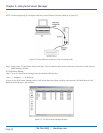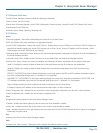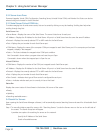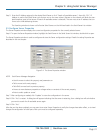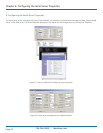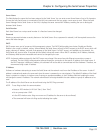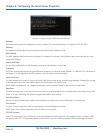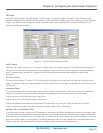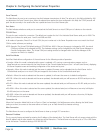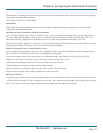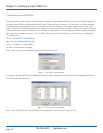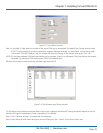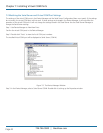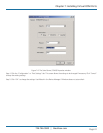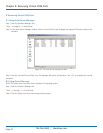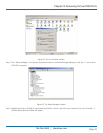
724-746-5500 | blackbox.com
Page 36
724-746-5500 | blackbox.com
Chapter 6: Configuring the Serial Server Properties
Force Transmit
This field allows the user to set a maximum time limit between transmissions of data. The value set in this field multiplied by 100
ms determines the Force Transmit time. When the elapsed time reaches the time configured in this field, the TCP/IP protocol will
pack the data currently in the serial buffer into a packet and send it out the Ethernet port.
Port Status
This field indicates whether a serial port is connected via the Serial Server to a virtual COM port of a device on the network.
TCP/UDP Port
This sets the port number for connection. The default port number for the 1-Port Industrial Serial Server serial port is 4000. The
default port numbers for serial ports 1 and 2 are 4000 and 4001.
In all modes of operation, Direct IP or Virtual COM, the port number set in the Server Properties menu must match the Virtual
COM or socket software port settings.
NOTE: Example: The Virtual COM default setting is TCP/UDP Port 4000. If the port # property is changed to 4001, the virtual
COM port will have to be changed to 4001. The hardware settings can be changed from the Serial Server Manager or
Console Configuration Menu. The Virtual COM port setting can also be changed within the Device Manager of the
computer on which it is installed.
Serial Port Mode
Serial Port Mode allows configuration of the serial server for the following modes of operation:
• Console—When this mode is selected and the server is updated, a PC running a communications program such as
HyperTerminal can communicate with the Serial Server via the Console Mode serial port (Port 1 of each Serial Server), displaying
the Server Properties screen and enabling configuration of the server and its ports.
• Upgrade—When this mode is selected and the server is updated, firmware can be uploaded into the Serial Server via the
Console Mode serial port or a virtual COM port mapped to the number of the Console Mode serial port.
• Default—When this mode is selected and the server is updated, it will revert the server to its default configuration.
• RS-232—When this mode is selected and the server updated, the selected serial port will become an RS-232 serial port on the
server.
• RS-422—When this mode is selected and the server updated, the selected serial port will become an RS-422 serial port on the
server.
• RS-485H—When this mode is selected and the server updated, the selected serial port will become a two-wire, half-duplex
RS-485 serial port on the server.
• RS-485F—When this mode is selected and the server updated, the selected serial port will become a four-wire, full-duplex
RS-485 serial port on the server.
Connection At
When the Connection Mode field is set to Client or Client (no heartbeat), this field becomes active, allowing the Serial Server
(acting as a client) to connect to the server either on Power up or on Data Arrival (first character arriving).
Max Connection
This field allows the user to configure the Serial Server to have up to eight TCP connections.
Remote IP Address
This is a security feature activated by entering the IP address of the desired client. The Serial Server will only communicate with the
listed IP address and all other requests for connection will be filtered out. The Serial Server must be set up as a TCP or UDP Server
to use this feature. The default setting is 255.255.255.255.



